The Future Role of A.I. in Healthcare & Patient Engagement

Artificial intelligence is changing the landscape of every business, including your healthcare practice. As one of the world’s fastest-growing industries, the global AI market is projected to grow 38.1% annually through the year 2030.
So how are the current and future roles of artificial intelligence (AI) in healthcare impacting your industry? And how can you ensure your practice isn’t left behind?
The answer is simple. Integrating forward-thinking AI into your medical practice now will not only improve patient engagement, but it’ll also increase your revenue. These two factors alone are enough to set your practice ahead of the competition and provide future growth and success.
The Importance of AI in Patient Engagement
As a medical professional, you understand the value of high patient engagement. You also know it’s not a guarantee. Ultimately, it’s the patient’s responsibility to decide on their level of engagement. The best thing you can do is provide them with the tools and information they need to engage.
This is where artificial intelligence (AI) in healthcare comes in.
When you equip your patients with innovative solutions to improve their medical experience, their level of engagement will improve. With more engagement comes:
- Better health outcomes: When patients are actively engaged, they are more likely to attend doctor appointments and recommended screenings.
- Improved patient experience: Simplified, easy to use and understand engagement opportunities equal more satisfied patient experiences.
- Lowered administrative costs: When you implement artificial intelligence in healthcare, you lessen wasted time, cut costs, and reduce waste.
- Increased business revenue: With lowered administrative costs and reduced waste, your bottom line increases. When patients are satisfied with your care, they are more likely to return for future visits and recommend your practice.
It’s impossible to predict how a patient will engage with your practice. But implementing AI in healthcare is almost guaranteed to improve patient engagement. You’ll see your practice grow and thrive with a comprehensive patient engagement system like Mend that offers one-of-a-kind AI using unparalleled machine learning.
AI in Healthcare Today
Artificial intelligence in healthcare is rapidly evolving. In the future, AI may be able to assist you with more of the tasks humans can do with equal, if not improved, precision. We are years away from artificial intelligence replacing humans in healthcare. But you may be surprised to learn of the current AI capabilities available right now.
Not all current AI healthcare solutions are created equal. Because of the rapid-paced evolution of technology, you want to make sure you choose what you implement into your practice wisely.
The most advanced AI technology solutions improve patient engagement and increase revenue by streamlining the way you do business.
Here are some of the ways artificial intelligence in healthcare is benefiting medical practices right now.
Advanced Machine Learning Technology
One of the most prominent AI solutions in healthcare is machine learning. Using advanced algorithms that learn and adapt to a patient’s activity can bring the efficiency and revenue of your practice to the next level.
Machine learning can predict how likely a patient is to cancel or show up to an appointment. But not all AI in healthcare solutions can do this.
Not all patients receive the same level of engagement opportunities with Mend, either. Our unique AI uses machine learning to provide more engagement opportunities for high-risk patients. Gently reminding and nudging the patients more likely to cancel or not show up gives your practice a leg-up on reducing the number of empty appointment times.
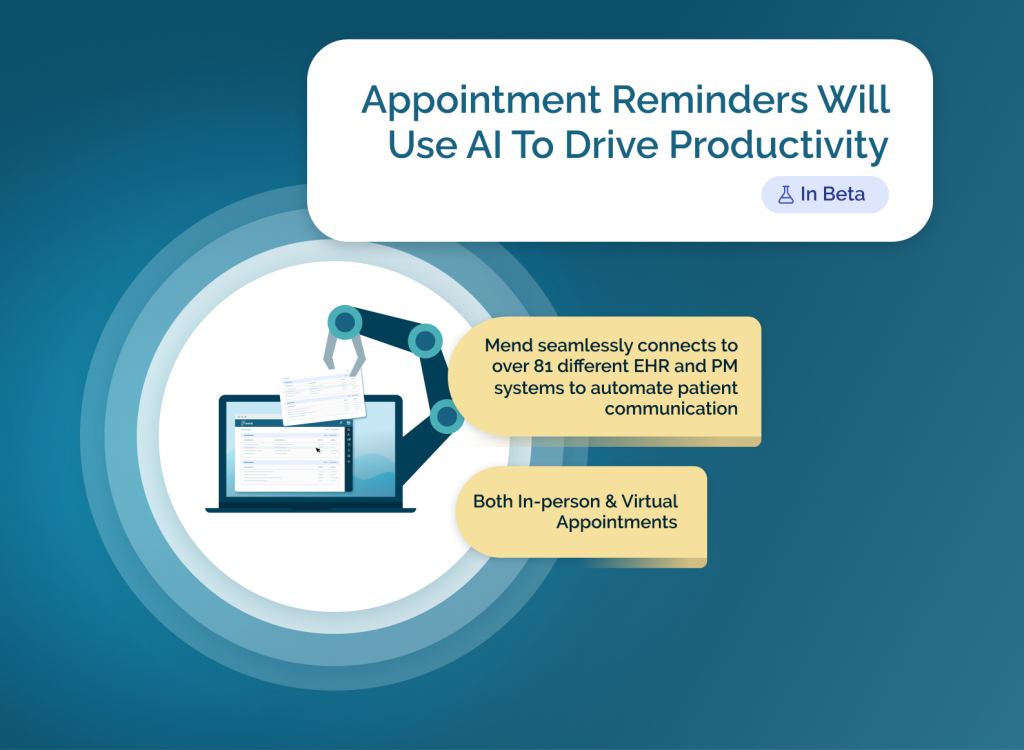
Streamlined Data Collection
Paperwork can be overwhelming and daunting for your patients and office staff. In fact, according to one study, doctors spend 49.2% of their time on paperwork.
You’ll bypass the overwhelm by implementing a comprehensive AI program into your system. Our digital intake forms eliminate physical waste and the time it takes to remind and collect information.
No more PDFs. No more lost paperwork. With Mend, your patients fill out interactive intake forms on any device. Based on their appointment type, our advanced artificial intelligence in the healthcare system knows the correct documents to send via email or text.
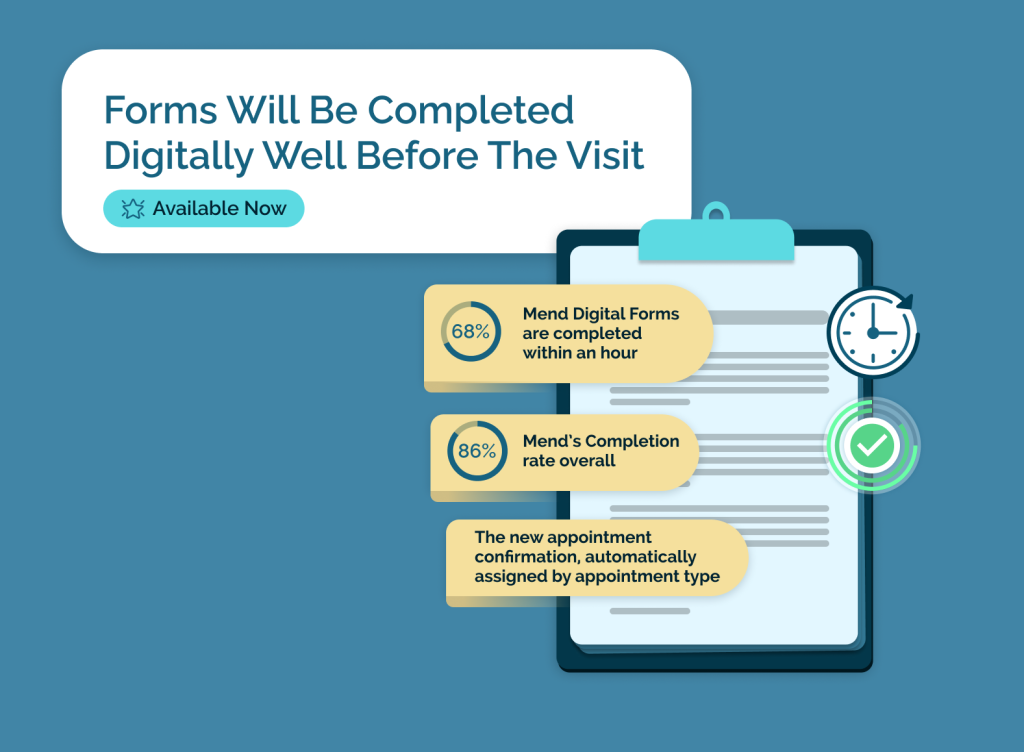
That means you:
- Simplify your intake process
- Increase patient satisfaction
- Decrease staff burden
- Schedule more patients
Optimized Scheduling
In days past, patients would have to wait to schedule or reschedule an appointment during regular office hours. Or they’d leave a message, and your office staff would waste time tracking them down to reschedule or confirm.
Advanced AI in healthcare technology allows for more efficient scheduling. With Mend, your patients can schedule and reschedule their appointments digitally 24/7/365. Whatever the appointment type, Mend can handle it. We’ve got you covered if they need in-person, telemedicine, kiosk, messaging, phone, or home appointments.
When you allow your patients to schedule and reschedule their own appointments, you’re reducing your practice’s no-show rates by 2-8%. That saves a 30-provider practice around $74 per visit. And that increases revenue by around $560,000.
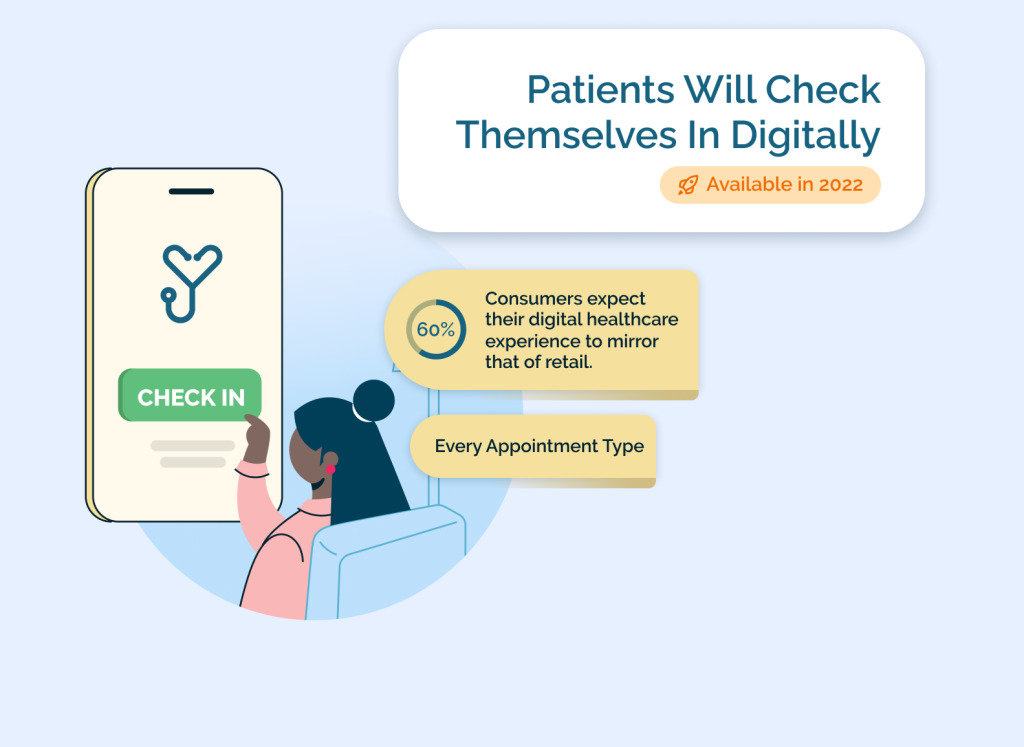
Enhanced Virtual Waiting Room Experience
If you offer telemedicine in your practice, providing a high-quality virtual waiting room is a must. As one of the most unique artificial intelligence options in healthcare, our Enhanced Virtual Waiting Room Experience (EVWR) improved patient satisfaction. In fact, we’ve seen a 23% increase in how satisfied our clients’ patients are with their telemedicine experience.
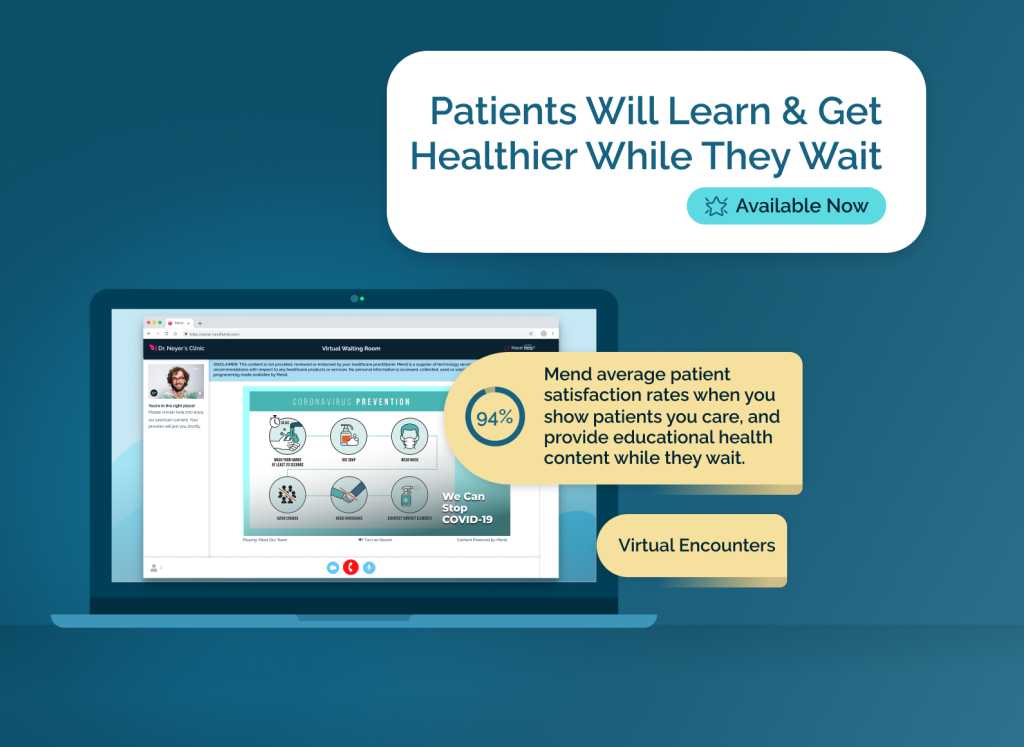
Your patients won’t spend their time waiting for you staring at a blank screen. Instead, using our advanced AI in healthcare EVWR, they’ll receive a custom-branded informational experience. As they wait, they engage in a Netflix-style library of Mend Media, like TED talks and health and wellness videos.
Not only that, but our advanced AI will check for connection issues while your patients wait. If there is an issue, our connectivity chatbots will offer solutions to connection issues before the appointment begins.
Efficient Capturing of Vitals
One of the most recent technologies to make an appearance in artificial intelligence in healthcare is capturing vitals. Believe it or not, you can now collect vital signs in a telemedicine appointment and before in-person visits.
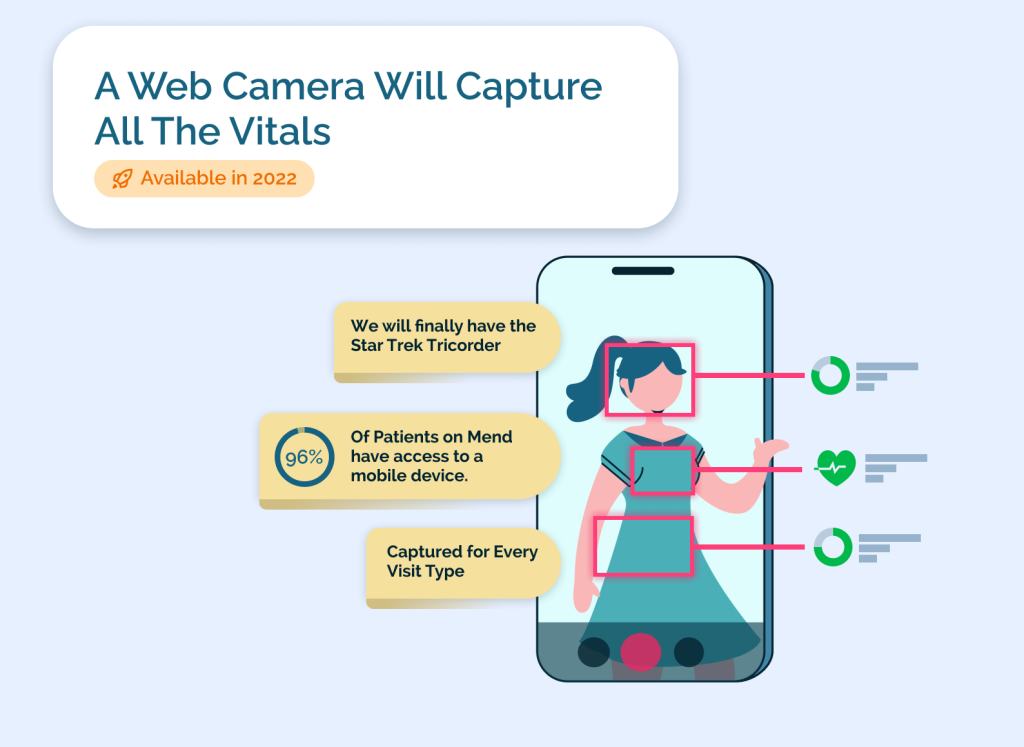
Because we continually advance with technology, here at Mend, we’ve implemented our patient engagement system to do just that. Using the web camera on any device, with the help of machine learning, FDA-approved vital signs are obtained.
Using this innovative AI in healthcare feature, vitals can be collected:
- Prior to an in-person appointment using our digital check-in process
- In your physical waiting groom
- During a telemedicine visit’s check-in process
- Remote check-ins for Remote Patient Monitoring (RPM)
Our impressively innovative AI can collect vital signs like:
- Blood pressure
- Heart rate
- Breathing
- Cardiac workload
- And more
Increased Payment Collection
Collecting copays and payments post-visit has never been easier with advanced AI in healthcare. Unfortunately, 75% of today’s providers still use paper and manual processes to collect payments.
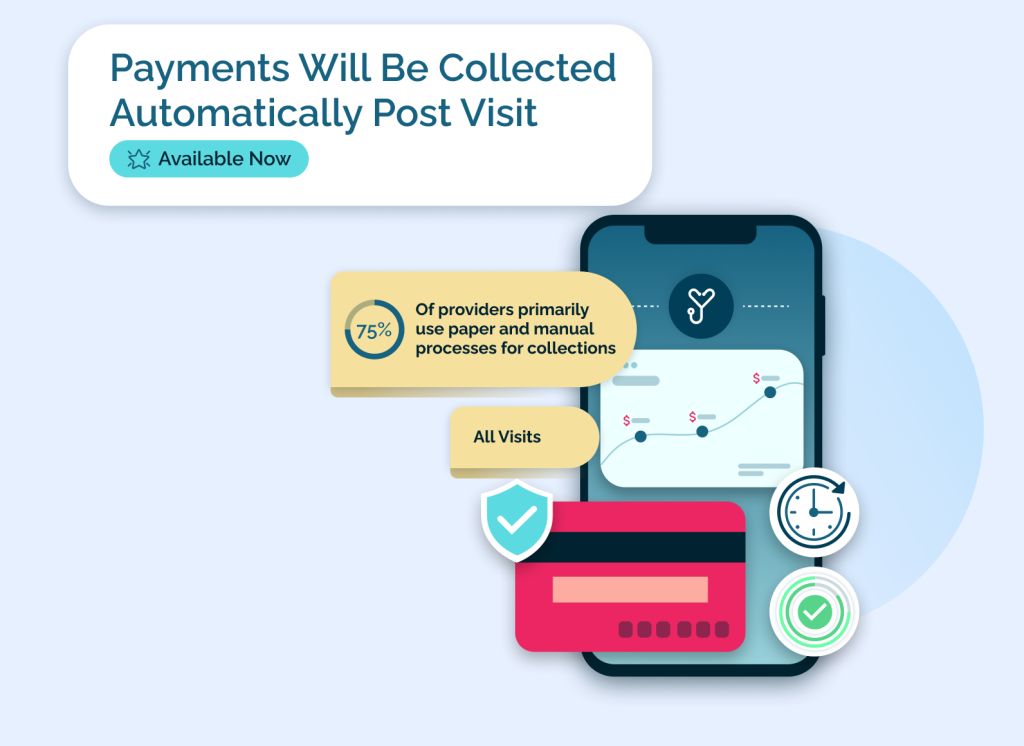
That’s not only time-consuming but can also result in lost revenue.
As soon as a claim is adjudicated showing a positive patient balance, Mend can charge a credit card on file or send a digital form to collect payment. And because Mend seamlessly integrates with your PMS, our advanced program:
- Gathers patient responsibility amounts
- Collects payments
- Records successful payments
- Notifies staff if payment is unable to be collected automatically
This results in a faster revenue cycle, less manual labor, and improved patient experience and satisfaction.
At Mend, we are always looking forward. We focus on improving patient engagement and increasing the speed and efficiency of practices like yours through digital solutions. You don’t want any old AI in healthcare solutions. You want one constantly evolving and adapting to today’s technological needs.
The Future of AI in Healthcare
The high-speed development of artificial intelligence in healthcare is challenging to keep up with. But there are advancements today that, while not quite ready yet, give the nod to what we’ll see in the future.
We are a long way away from AI replacing humans in healthcare. But continuing progress within AI in healthcare will undoubtedly help patients and providers in the near future.
There are three key AI advancements to keep an eye on that should make their way into the medical field within the next decade.
A Single Healthcare Infrastructure
Access to the care patients need today is largely dependent on location. Whether someone needs emergency care for a complex procedure, acute illness, or routine outpatient treatment, their options for care depend on where they are.
There is artificial intelligence on the horizon of healthcare that’ll change all of that. Rather than medical centers like hospitals offering a wide range of care options, they’ll focus more on emergencies, acute illnesses, and complex procedures. Less urgent needs are addressed at clinics, specialist centers, and outpatient surgery care locations.
How is AI in healthcare going to do this?
They do this by connecting these locations through one digital infrastructure. AI will soon be able to analyze local health data and monitor the supply and demand in real-time. These advancements aim to direct patients to and provide the correct treatment. In turn, this reduces bottlenecks in the healthcare system, allowing less wait time and more accurate treatment.
And what about sharing data across the globe?
Currently, about 90% of medical data isn’t shared due to privacy concerns. As AI advancements continue, we’ll soon be able to balance the risks and benefits of data sharing. When providers have access to medical images and patient data from around the world, lives will be saved. Patients will receive the appropriate care when and where they need it.
Predictive Care
Predictive care is one of the most exciting advancements of artificial intelligence in healthcare. Rather than waiting for symptoms to appear, AI will soon be able to assist providers in disease prediction.
Current factors used to predict risk factors of developing certain diseases include genetics and lifestyle habits. With the help of AI and predictive analytics, we’ll soon be able to understand other factors that affect our health.
Some of these factors include where we work, air pollution, where we live, our income level, and what we eat. The World Health Organization calls these factors social determinants of health (SDOH).
In the future, AI in healthcare will also assist radiologists in making diagnoses. Technological advances are going to help them predict if a patient will develop lung or breast cancer sooner. Beyond that, AI aims to help providers determine how well a patient will respond to specific treatments.
Increased Patient Engagement and Provider Experience
When patients have access to the appropriate care when and where they need it, they’re more likely to engage in their health actively. AI in healthcare today and in the future means less frustration, easily accessible scheduling, and simple payment solutions. Using predictive healthcare networks and efficient workflows, like those provided by Mend, results in a better user experience.
Providers will experience less burnout with the help of artificial intelligence in healthcare. Not long ago, providers faced the daily stress of trying to help too many patients. The administrative staff wasted valuable time with no-shows and chasing down patients for rescheduling and payment collection. Today, thanks to AI, these challenges are being reduced. And it’s only getting better.
Implementing Innovative AI Solutions Into Your Practice Can Start NOW
What are the challenges your practice faces today? Are you wasting time with stacks of patient paperwork, working with an inefficient scheduling system, and losing revenue? If you’re like many providers, you are likely facing many of these issues daily.
Improving patient engagement and increasing your revenue isn’t as challenging as you may think. When you integrate Mend into your practice, you’ll resolve many of your business struggles quickly. As one of the most advanced options for AI in healthcare on the market today, Mend boasts an impressive number of features to improve patient engagement and increase revenue.
- Digital Intake Forms: eliminates messy paperwork and allows your patients to complete necessary forms on any device ahead of time
- Patient Scheduling: patients can schedule and reschedule their own appointments from any device 24/7/365
- Patient Appointment Reminders: our advanced AI algorithm knows how many reminders to send each patient, reducing no-shows
- HIPAA Compliant Telemedicine: expand your reach with fast, less costly, HIPAA-compliant telemedicine
- Group Video and Scheduling: simple group scheduling solutions using HIPAA-compliant video conferencing
- Vital Sign Capturing: Mend can collect patients’ vital signs before or during an in-person or virtual visit, saving time and money
- Seamless EHR and PMS Integrations: Mend integrates into your already existing EHR and PMS software with ease
- Telepsychiatry Software: if you offer behavioral healthcare, our telepsychiatry solutions can help reduce your no-show rates from 30-40% to single digits
- Enhanced Virtual Waiting Room: your patients stay engaged, informed, and entertained while waiting for their virtual appointment to begin
When your patients have an easy, efficient, and rewarding experience with your practice, they’re much more likely to stay engaged. And when patient engagement increases, so does your revenue.
Integrating Mend into your practice can take your practice to the next level in service, staff efficiency, and patient satisfaction. It doesn’t require any special logins or software. Your patients can use Mend on any smartphone, tablet, or computer.
That means upgrading your digital workflows has never been easier for you or your patients.
Not only is Mend the most advanced AI in healthcare technology on the market, but we’re constantly evolving with changing technology. That means when you partner with Mend, you improve your current practice and ensure you stay on top of future AI developments for years to come.